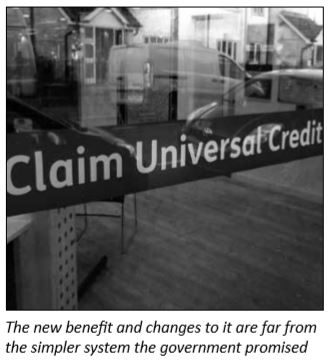Universal credit has several faults and failings, as many advice workers know. One fundamental problem is the relatively low amounts it awards. For a lot of people, universal credit is less generous than the previous system of older benefits, known as legacy benefits. This disproportionately affects people with disabilities because all the disability related premiums available in legacy benefits have not been replicated in universal credit. However, following successful legal challenges over the amounts of universal credit payable to disabled people, the government has been forced to take certain steps. These steps include the introduction of laws that:
● Temporarily prevent “severely disabled” people from claiming universal credit (this is called the “severe disability premium (SDP) gateway”)
● Allow for compensatory transitional payments to be made to some disabled people who had to claim universal credit in the past and lost out financially as a result.
The SDP gateway was introduced in January 2019. It stops any person who is getting a legacy benefit that includes an SDP from being able to claim universal credit, regardless of any other circumstances. This gatew ay is in place until at least January 2021. If the claimant’s circumstances change so that they are no longer entitled to an SDP, the gateway will no longer apply. Claimants who were getting a legacy benefit that included an SDP but lost this because they were “naturally migrated” to universal credit before the gateway was introduced (for example if they moved to a rented home in a local authority area different from where they had been living) can get a transitional SDP amount.
ay is in place until at least January 2021. If the claimant’s circumstances change so that they are no longer entitled to an SDP, the gateway will no longer apply. Claimants who were getting a legacy benefit that included an SDP but lost this because they were “naturally migrated” to universal credit before the gateway was introduced (for example if they moved to a rented home in a local authority area different from where they had been living) can get a transitional SDP amount.
Transitional payments
Transitional payments comprise an ongoing monthly payment and an additional lump sum to cover the period since the claimant moved to universal credit. The claimant must continue to meet the underlying conditions for the SDP to qualify. As the idea is to assist people who are worse off as they have lost the SDP, these compensation payments are not available to those who start to meet the SDP eligibility criteria only after they have migrated to universal credit. However, if they met the entitlement criteria before moving to universal credit but for some reason were not paid the SDP, they could be entitled to the transitional payments. The SDP is worth £65.85 a week for a single person and £131.70 a week for a couple where both partners are eligible. The monthly transitional payments do not work to replicate the exact amount that disabled people were getting under legacy benefits. Transitional payments are paid at three different rates of £120, £285 and £405 per month. The rate paid depends on whether a claim is for a single person or a couple, and whether the claimant is in the limited capability for work and work-related activity (LCWRA) group. For example, where a universal credit claimant has been found to have LCWRA, and therefore already receives an additional amount in their universal credit award because of a health condition, they get only £120 extra per month.
Compensation
In addition to existing payments not covering the loss of the SDP, no compensation is available for the loss of the enhanced disability premium available in legacy benefits. Law firm Leigh Day is involved in a legal case to make the government award compensation that covers the total loss to people with disabilities who had to move to universal credit and were significantly worse off as a result. A different compensation, called “transitional protection”, will be paid on top of the regular award to all claimants who are moved from legacy benefits to universal credit through “managed migration”. This is so they are no worse off than at the time that they are migrated. Most people who are claiming universal credit now are new claimants or those who previously claimed legacy benefits and had a change of circumstances, which meant they had to claim universal credit via natural migration. No transitional protection is available to these people. At present, the only managed migration is taking place through a pilot in Harrogate, which is due to be completed at the end of this year. No one outside Harrogate will be put through the managed migration process until the pilot is extended to other parts of the UK, although it is not known when that will happen.
“No compensation is available for the loss of the enhanced disability premium”
The government has said it plans for all claimants to have moved fully to universal credit, through both natural and managed migration, by September 2024. Universal credit and changes to it continue to be complex and far from a simplification of the benefits system as trumpeted by the government. The need for people with learning disabilities and the professionals who support them to seek advice from an experienced advice worker where necessary is as crucial as ever.
Charlie Callanan is an adviser and writer on welfare rights




